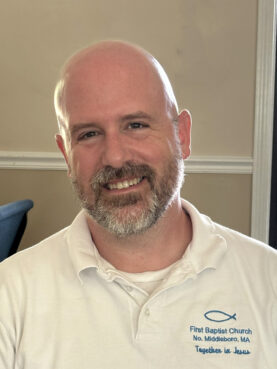NORTH MIDDLEBORO, Mass. (RNS) — The Rev. Jason Genest loves God and his church.
He also loves U.S. history.
Which is why he gets nervous when he hears people talk about America being founded as a Christian nation. Or wanting to make America Christian by using the power of politics.
America tried that in the past, he said. It did not go well — including for the founder of Genest’s own church.
First Baptist Church of North Middleboro, Massachusetts, was founded by Isaac Backus – a champion of religious freedom in the 1700s — who often found himself at odds with leaders of the Congregational church, which at the time was the official religion of the Bay State.
The Rev. Jason Genest. (RNS photo/Bob Smietana)
So-called New Light Baptists like Backus, who were followers of the famed evangelical preacher George Whitefield — a leader of the First Great Awakening who stressed the need for personal conversion — were seen as troublemakers and threats to public order by leaders of the official church, which was essentially a state bureaucracy, said Genest.
New Light Baptists questioned social institutions, by claiming the baptisms — and sometimes the marriages — of the unconverted were invalid. They also set up rival churches to draw worshippers away from parish churches and, more importantly, refused to pay taxes to support those parish churches. That led to government crackdowns, with some gatherings of New Light Baptists banned as illegal.
“When you get along with a state bureaucracy, it’s great,” Genest said. “When you disagree, you have problems.”
Today, as America has grown both more secular and more religiously pluralistic, there has also been a rise in Christian nationalism — an insistence that America was founded by Christians and should be run by Christians. But the founding era was not a religious utopia, where Colonists were free to choose their faith. Instead, disputes between different kinds of Christians were fierce in the Colonies that became the United States. Those Colonies often had official churches that used government power to collect taxes, enforce doctrine and crush their rivals.
Catherine Brekus, a religious historian at Harvard, says there’s a powerful myth that the early American Colonies were founded on the idea of religious freedom.
“That is not true,” she said.
“We think that religious freedom was enshrined from the beginning, and instead it was a long and hard fight,” she said.
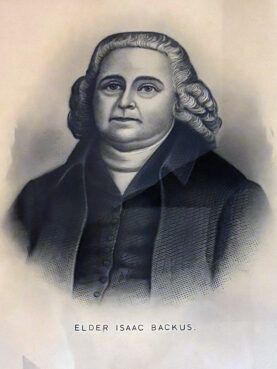
Portait of Isaac Backus at First Baptist Church of North Middleboro, Mass. (RNS photo/Bob Smietana)
In the 1700s, some Christians, like Backus’ mother and brother, ended up in jail. Others found constables at the door, hauling their possessions away for back taxes — taxes meant to subsidize the state church. Still others were banned from meeting altogether in so-called illegal churches.
Backus’ concerns about the power of government to dictate what people believed — and to punish those who disagreed — fueled his efforts to separate the church and state in Massachusetts. (This became reality in 1833, nearly three decades after Backus died.)
While Genest believes churches should be active in public life, that’s different from trying to mandate what people believed. When the government has that power, bad things happen, he said.
“I hate to say we use God, but I think God is often used as a means of people getting what they want,” Genest said.
RELATED: What is Christian nationalism, anyway?
About 30 miles west of North Middleboro stands another First Baptist Church — also known as the First Baptist Church in America — with its own story of clashing with Christian nationalism.
This year on Oct. 13, the guest speaker at First Baptist was John McNiff, a retired national park ranger and historical reenactor who often portrays Roger Williams, the church’s founder. Williams was exiled from Massachusetts in the 1600s because of his “dangerous ideas” about religious freedom.
Among those ideas: State leaders should not use civil power to make people go to church or observe religious rules. During his talk, McNiff pointed out that none of the worshippers in the service were there because the law required them to be.
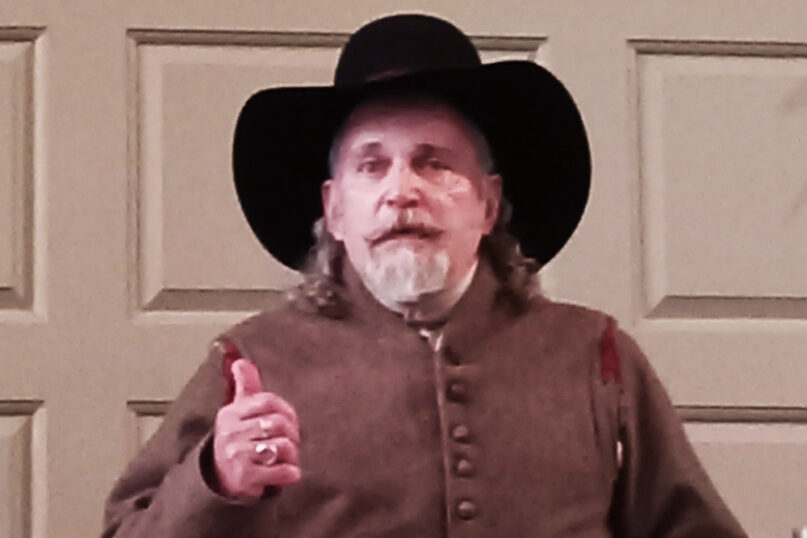
Historical reenactor John McNiff portrays Roger Williams at the First Baptist Church in America on Oct. 13, 2024, in Providence, R.I. (Photo by J. Stanley Lemons)
“These politicians, these rulers, were compelling people to a faith that they did not believe in,” he said, drawing from Williams’ writings. “The civil sword can make a nation full of hypocrites, but not one true Christian.”
That fear of state-run religion was shaped in Williams’ childhood, said Charlotte Carrington-Farmer, a professor of history at Roger Williams University in Rhode Island.
“Williams grew up in a world of religious turmoil, where the ‘official’ state religion changed on the whim of a monarch,” Carrington-Farmer wrote in a 2021 book chapter about religious freedom and Williams, who was born in England.
When he arrived in New England, Williams realized he had not come to a place where people were free to worship.
“When he gets to Massachusetts, he’s horrified,” said Carrington-Farmer, editor of a forthcoming collection of Williams’ writing, called “Roger Williams and His World.” “He’s seen the same persecution, just under a different umbrella.”
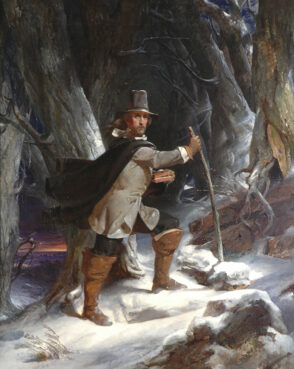
“The Banishment of Roger Williams” by Peter F. Rothermel, circa 1850. (Image courtesy of Wikipedia/Creative Commons)
Williams became an outspoken advocate for religious freedom, often holding meetings in his home to advocate for his ideas. In particular, he believed government should have no right to enforce religious rules. That put him at odds with other Puritan leaders such as Gov. John Winthrop and clerics who felt it their God-given duty to keep their community holy.
Tired of Williams’ “diverse new & dangerous opinions,” a Boston court banished him on Oct. 9, 1635, giving him six weeks to leave — or else government officials would remove him by force. He eventually fled the state during a blizzard that winter, going to Narragansett Bay, where he founded the town of Providence and later, First Baptist.
Carrington-Farmer said Puritan leaders had tried to avoid banishing Williams, whom they held in high esteem, and tried to get him to moderate his views. But Williams would not compromise.
Puritan leaders, she said, felt caught between a rock and a hard place. They had experienced persecution for the faith in England and wanted to create a new community that was faithful to the Bible and Christianity — which, as John Winthrop put it, would be a city on a hill. They feared troublemakers like Williams would put that vision at risk. The Puritans believed God would punish them if they allowed sin and dissent to flourish.
Ironically, in being banished, Williams was lucky. Several decades later, Mary Dyer, Marmaduke Stephenson, William Leddra and William Robinson—all members of the Society of Friends, or Quakers — were hanged on the Boston Common for defying the power of the established church.
On a sunny afternoon in early September this year, a pair of tourists who identified themselves as descendants of Williams stopped in the church he started, to have a look. After settling them in to watch a short video about the history of First Baptist, the Rev. Jamie Washam, the church’s current pastor, sat on the church stairs for a conversation about Williams’ legacy.
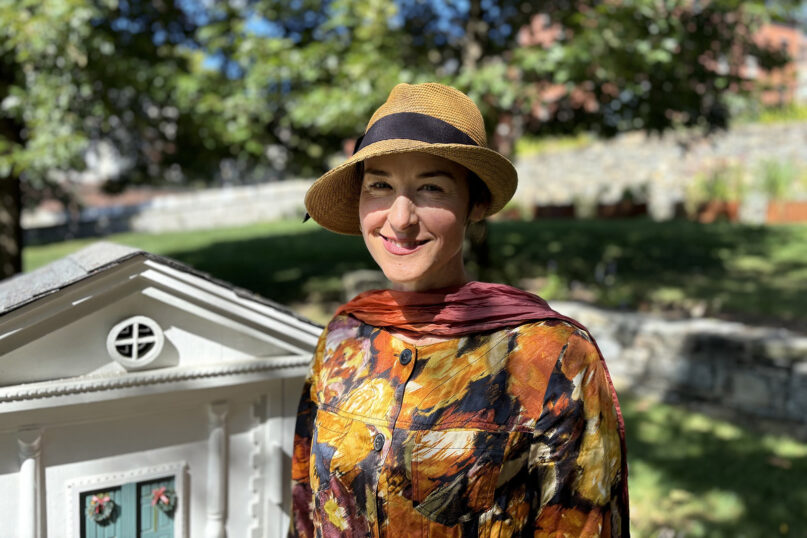
The Rev. Jamie Washam. (RNS photo/Bob Smietana)
Washam, the pastor of First Baptist since 2015, said she worries that the hard-won lessons of Williams’ life have been forgotten.
“The story and legacy of Roger Williams reminds us that it has always been a struggle to advocate for religious liberty,” said Washam, sitting on the church steps. “We continue to fervently believe that that cost is worth it.”
She’s skeptical of the idea that voting for the right candidate will make America more Christian.
“Better legislation doesn’t make us better Christians,” she said. “Being more faithful and loving and just people make us better Christians.”
Some Christians, however, worry something essential is being lost as the country becomes less religious. That’s the case for Jerry Newcombe, executive director of the Providence Forum, which has produced a series of videos about the Christian origins of the United States.
“I feel like there’s been a great deal of misinformation and forgetting,” said Newcombe, whose organization seeks to “preserve, defend and advance the Judeo-Christian values of our nation’s founding.”
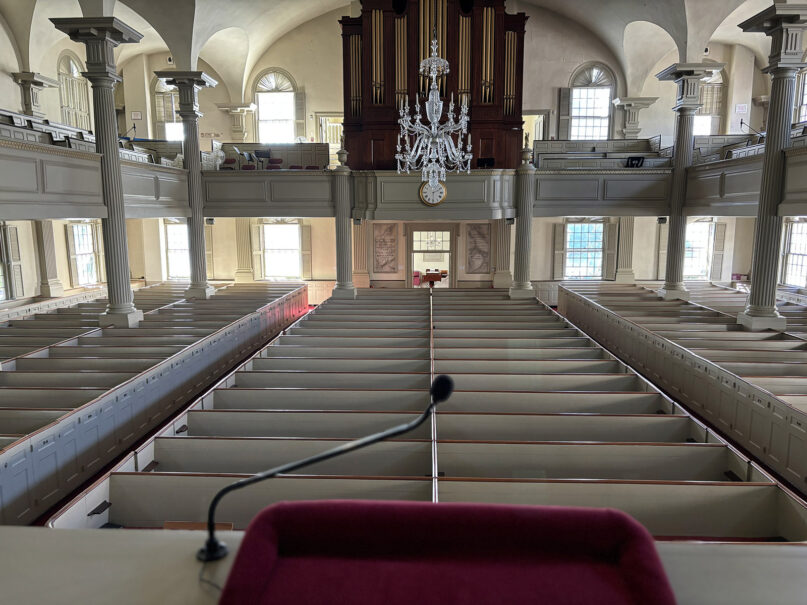
First Baptist Church in America in Providence, R.I. (RNS photo/Bob Smietana)
While he fiercely promotes the idea that America was founded on Christianity, Newcombe admits things did not always go well — especially for religious groups that clashed with political leaders over matters of faith.
“It’s not as if everything was Shangri-la, especially if you were a nonconformist,” he said in a phone interview.
“In retrospect, we don’t agree with that,” he said. “But don’t throw God out of the whole equation.”
Other conservative Christians go much further, saying America must return to its Christian roots or perish. Josh Abbotoy, head of American Reformer magazine and an investor who wants to rebuild a Christian America, has suggested the U.S. might need a “Christian Franco” — a reference to the longtime Spanish Catholic dictator — to restore Christianity to its rightful place in American society. Others, like the National Conservatism movement, believe the government should use Christianity to shape society. During a recent Nat Con event, Al Mohler, president of Southern Baptist Theological Seminary, praised the Protestant empire that built America — saying that religious foundation must be restored.
“I want to say that I do not believe this nation and all that it represents can survive abandoning its theological roots. We will recover those roots and commitments or lose everything,” Mohler said earlier this year.
Conservative activists such as Charlie Kirk have called for a return to America’s Christian roots, praising the fact that the early Colonies had religious tests for office and were run explicitly by Christians.
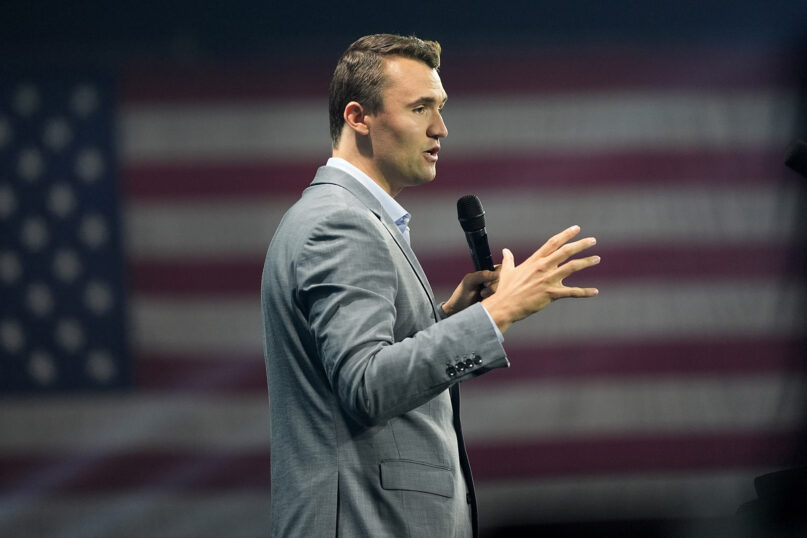
Turning Point USA founder Charlie Kirk speaks before Republican presidential candidate former President Donald Trump arrives at the Turning Point Believers’ Summit, July 26, 2024, in West Palm Beach, Fla. (AP Photo/Alex Brandon)
“One of the reasons we are living through a constitutional crisis is that we no longer have a Christian nation but we have a Christian form of government. And they are incompatible,” said Kirk, in advocating for an end to the separation of church and state and a return to a Christian America during an online panel discussion.
Douglas Winiarski, professor of religious studies at the University of Richmond and author of “Darkness Falls on the Land of Light” — which details the end of established churches in New England — said that nostalgia for a Christian America can overlook how complicated religion was in the founding era.
He said that by the early 18th century, the Congregational church — which had descended from the Puritans — had become fairly tolerant, allowing space for dissenters as long as they paid their taxes and didn’t cause trouble.
That tolerance ended, however, with the rise of New Light Baptists and others who disagreed with the teachings of the Congregationalists and refused to submit to their authority on religious matters.
Ironically, Congregationalists, who had dominated religious life in Massachusetts and other New England states for two centuries, would learn the downside of having a state religion, with the rise of Unitarianism in the early 1800s. Residents began electing Unitarian ministers to lead parish churches over the objections of Congregational church members, who were Trinitarians.
That led to court battles over church property, with the state Supreme Court siding with Unitarians in 1821. As a result, the Congregationalists found themselves losing the buildings and congregations they had controlled since the 1600s.
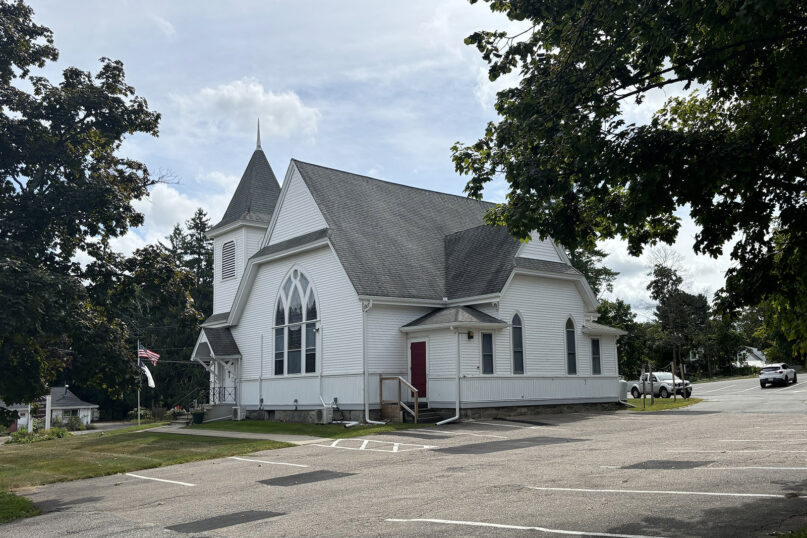
First Baptist Church of North Middleboro, Mass., was founded in 1756. (RNS photo/Bob Smietana)
Eventually, because of the efforts of Backus and others like him, Massachusetts allowed a kind of moderated religious freedom, in which the taxes paid to the state church were diverted to other congregations — including Baptists and the breakaway Congregationalists. But it was an uneasy peace and led to the disestablishment—the end of official status—of a state church in Massachusetts.
The archives from First Parish in Cambridge — which was an official government church from the 1600s to the early 1800s — were filled with letters from residents of that city, requesting their taxes be sent to other churches in the 1800s, said Gloria Korsman, a First Parish historian and a Harvard librarian. At that time, the clerk of the parish church — a state church that eventually became Unitarian — was responsible for collecting taxe=s.
Korsman said she can’t imagine why anyone would want to go back to that time.
“I don’t know what there is to long for,” she said. “During the time of disestablishment, neighbors were against neighbors on this issue. It wasn’t like a peaceful time or a time when people were unified. There was a lot of division.”
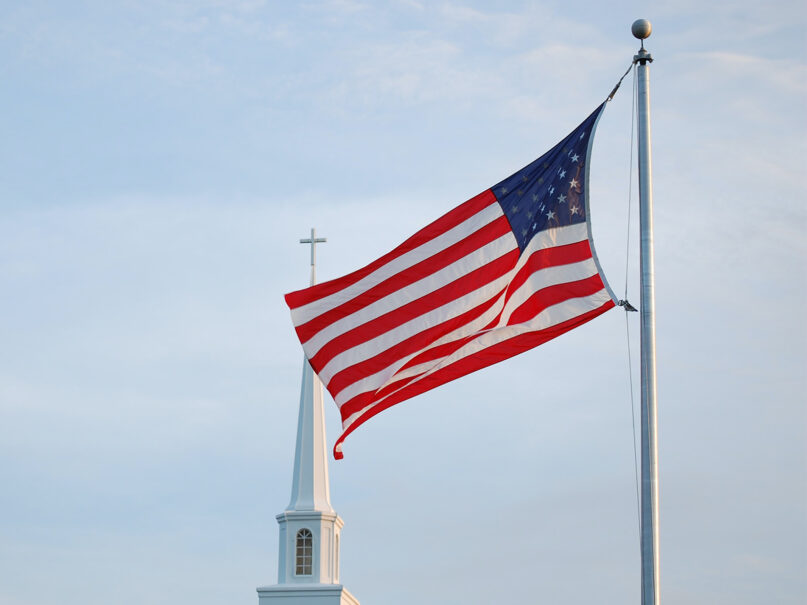
(Photo by Brad Dodson/Unsplash/Creative Commons)
RELATED: Whose Christianity do Christian nationalists want?
This story was reported with support from the Stiefel Freethought Foundation.

